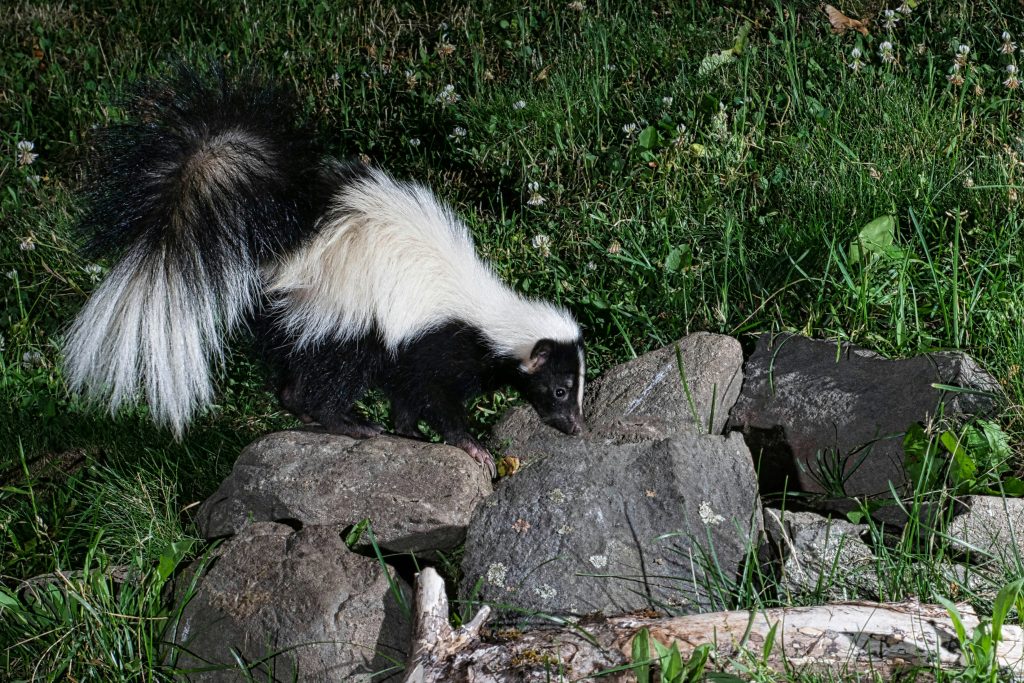
Skunk as Pet? Here’s the (Surprising) Truth!
When we think of skunks, the first thing that often comes to mind is their infamous ability to spray a foul-smelling liquid. But beyond this natural defense mechanism, skunks are intelligent, curious, and—surprisingly—can be affectionate when raised in captivity.
So, can skunks be pets? The answer is yes, but it’s not as simple as bringing one home. Skunks require specialized care, legal considerations, and a commitment that goes beyond what many traditional pets demand.
Is Skunk as a Pet Legal?
Before considering a pet skunk, check your local laws. In many places, owning a skunk is either restricted or outright illegal. Even where legal, you may need special permits. As of now, pet skunks are legal in several U.S. states including Florida, Indiana, Michigan, and Pennsylvania, but regulations may vary by county or city.
Make sure to verify the most current legal requirements before adopting one.
Already have a dog as a pet? Check out these top 10 calming treats for anxious dogs!
The Ethics of Keeping a Skunk!

Just because you can legally own a skunk doesn’t mean it’s the right decision for everyone. Skunks are not low-maintenance animals. They require:
- A specialized diet
- Daily social interaction and mental stimulation
- Safe housing
- Access to an exotic animal veterinarian
Additionally, many pet skunks are descented—meaning their scent glands are surgically removed. While this is common, it’s a controversial practice. Some argue it robs the skunk of its natural defense, especially if it ever escapes.
Behavior and Temperament!
When raised from a young age, skunks can become quite sociable. They’re playful, affectionate, and enjoy human interaction. However, they also have a stubborn streak and can be mischievous—raiding cabinets, hoarding socks, and rearranging your home if left unsupervised.
They’re generally quiet pets but do make noises such as chirps, huffs, and whines. And although not typically aggressive, they may bite if frightened or provoked. Due to the lack of an approved rabies vaccine for skunks, a bite can lead to serious consequences, including quarantine or euthanasia by animal control.
Housing Your Pet Skunk!
Skunks should be kept indoors as much as possible. Since most pet skunks are descented, they lack their primary defense and are vulnerable outside. Many owners dedicate a safe room or play area to their skunk and allow them to roam supervised.
A large dog crate may be used when you’re away, but they should never be confined for long periods. Skunks can also be litter trained and require soft bedding, plenty of toys, and environmental enrichment to stay mentally stimulated.
Feeding Your Skunk!

Skunks are omnivores and need a balanced diet. In captivity, their diet should consist of:
- 60-70% lean proteins: Cooked chicken, turkey, fish, eggs, or feeder insects
- 30-40% vegetables: Fresh or cooked (avoid canned due to salt content)
- Occasional fruits as treats
- Supplements for calcium and taurine if advised by a vet
Some skunks enjoy a bit of plain yogurt or cooked grains. Always provide fresh water.
Avoid toxic foods like chocolate, onions, or anything high in sugar or salt.
Health and Veterinary Care!
Common health issues in skunks include:
- Metabolic bone disease (from poor calcium intake)
- Diabetes
- Obesity
- Dental problems
- Cardiac conditions
It’s essential to find a vet experienced with exotic pets. Your skunk will need vaccinations (like distemper), regular deworming, and should be spayed or neutered around four months of age to reduce aggression and prevent reproductive-related cancers.
Enrichment and Exercise!
Skunks are active and require both physical and mental stimulation. Daily playtime is a must. Toys designed for dogs or cats usually work well, but supervision is needed as skunks may chew or swallow small parts.
They enjoy exploring, digging, and solving puzzles. Interactive games, safe chew toys, and hiding treats around the house can help keep them entertained.
Final Thoughts!
While skunks can be loving and quirky pets, they are not for everyone. They require commitment, patience, and specialized care. If you’re ready to meet their needs—and your local laws allow it—a skunk might just be the most unusual and delightful companion you’ll ever have.
Always consult with veterinarians, breeders, and skunk owners before making a decision. Responsible pet ownership begins with understanding the animal and ensuring you’re equipped to give them a safe, happy life.
Frequently Asked Questions!
Are skunks legal to own as pets?
Skunk ownership is regulated by state and local laws. In the U.S., some states like Florida, Indiana, and Pennsylvania allow it with proper permits. Always check with your local wildlife or animal control authority before adopting one.
Do pet skunks still spray?
Most domesticated skunks have their scent glands surgically removed (a process called descenting). However, descenting is controversial and not allowed in some regions due to ethical and safety concerns.
Are skunks aggressive?
Generally, no. When raised in a loving environment, skunks are curious and friendly. However, they can bite or become defensive if frightened or handled roughly.
Can skunks be trained like dogs or cats?
Skunks can be litter trained and taught simple routines, but they are more independent than dogs. Training takes time and patience, and food-based positive reinforcement works best.
What do pet skunks eat?
A balanced diet for skunks includes lean meats, vegetables, some fruits, and occasional eggs or insects. Avoid processed foods, sugar, chocolate, and anything toxic to animals.
Do skunks get along with other pets?
It depends on the skunk’s personality and the other animals in the home. Some skunks coexist peacefully with dogs or cats, while others may feel threatened. Introductions should be gradual and always supervised.
Do skunks need to see a special vet?
Yes. Exotic pet veterinarians are recommended because skunks require specific care, vaccines (like for distemper), and ongoing health monitoring. Not all vets will treat skunks.





